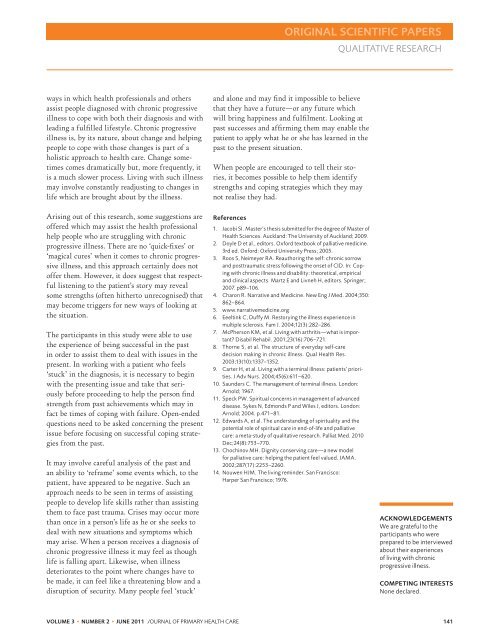single PDF of the entire issue - The Royal New Zealand College of ...
single PDF of the entire issue - The Royal New Zealand College of ...
single PDF of the entire issue - The Royal New Zealand College of ...
You also want an ePaper? Increase the reach of your titles
YUMPU automatically turns print PDFs into web optimized ePapers that Google loves.
ORIGINAL SCIENTIFIC PAPErS<br />
quaLitative research<br />
ways in which health pr<strong>of</strong>essionals and o<strong>the</strong>rs<br />
assist people diagnosed with chronic progressive<br />
illness to cope with both <strong>the</strong>ir diagnosis and with<br />
leading a fulfilled lifestyle. Chronic progressive<br />
illness is, by its nature, about change and helping<br />
people to cope with those changes is part <strong>of</strong> a<br />
holistic approach to health care. Change sometimes<br />
comes dramatically but, more frequently, it<br />
is a much slower process. Living with such illness<br />
may involve constantly readjusting to changes in<br />
life which are brought about by <strong>the</strong> illness.<br />
Arising out <strong>of</strong> this research, some suggestions are<br />
<strong>of</strong>fered which may assist <strong>the</strong> health pr<strong>of</strong>essional<br />
help people who are struggling with chronic<br />
progressive illness. <strong>The</strong>re are no ‘quick-fixes’ or<br />
‘magical cures’ when it comes to chronic progressive<br />
illness, and this approach certainly does not<br />
<strong>of</strong>fer <strong>the</strong>m. However, it does suggest that respectful<br />
listening to <strong>the</strong> patient’s story may reveal<br />
some strengths (<strong>of</strong>ten hi<strong>the</strong>rto unrecognised) that<br />
may become triggers for new ways <strong>of</strong> looking at<br />
<strong>the</strong> situation.<br />
<strong>The</strong> participants in this study were able to use<br />
<strong>the</strong> experience <strong>of</strong> being successful in <strong>the</strong> past<br />
in order to assist <strong>the</strong>m to deal with <strong>issue</strong>s in <strong>the</strong><br />
present. In working with a patient who feels<br />
‘stuck’ in <strong>the</strong> diagnosis, it is necessary to begin<br />
with <strong>the</strong> presenting <strong>issue</strong> and take that seriously<br />
before proceeding to help <strong>the</strong> person find<br />
strength from past achievements which may in<br />
fact be times <strong>of</strong> coping with failure. Open-ended<br />
questions need to be asked concerning <strong>the</strong> present<br />
<strong>issue</strong> before focusing on successful coping strategies<br />
from <strong>the</strong> past.<br />
It may involve careful analysis <strong>of</strong> <strong>the</strong> past and<br />
an ability to ‘reframe’ some events which, to <strong>the</strong><br />
patient, have appeared to be negative. Such an<br />
approach needs to be seen in terms <strong>of</strong> assisting<br />
people to develop life skills ra<strong>the</strong>r than assisting<br />
<strong>the</strong>m to face past trauma. Crises may occur more<br />
than once in a person’s life as he or she seeks to<br />
deal with new situations and symptoms which<br />
may arise. When a person receives a diagnosis <strong>of</strong><br />
chronic progressive illness it may feel as though<br />
life is falling apart. Likewise, when illness<br />
deteriorates to <strong>the</strong> point where changes have to<br />
be made, it can feel like a threatening blow and a<br />
disruption <strong>of</strong> security. Many people feel ‘stuck’<br />
and alone and may find it impossible to believe<br />
that <strong>the</strong>y have a future—or any future which<br />
will bring happiness and fulfilment. Looking at<br />
past successes and affirming <strong>the</strong>m may enable <strong>the</strong><br />
patient to apply what he or she has learned in <strong>the</strong><br />
past to <strong>the</strong> present situation.<br />
When people are encouraged to tell <strong>the</strong>ir stories,<br />
it becomes possible to help <strong>the</strong>m identify<br />
strengths and coping strategies which <strong>the</strong>y may<br />
not realise <strong>the</strong>y had.<br />
References<br />
1. Jacobi SI. Master’s <strong>the</strong>sis submitted for <strong>the</strong> degree <strong>of</strong> Master <strong>of</strong><br />
Health Sciences. Auckland: <strong>The</strong> University <strong>of</strong> Auckland; 2009.<br />
2. Doyle D et al., editors. Oxford textbook <strong>of</strong> palliative medicine.<br />
3rd ed. Oxford: Oxford University Press; 2005.<br />
3. Roos S, Neimeyer RA. Reauthoring <strong>the</strong> self: chronic sorrow<br />
and posttraumatic stress following <strong>the</strong> onset <strong>of</strong> CID. In: Coping<br />
with chronic illness and disability: <strong>the</strong>oretical, empirical<br />
and clinical aspects. Martz E and Livneh H, editors. Springer;<br />
2007. p89–106.<br />
4. Charon R. Narrative and Medicine. <strong>New</strong> Eng J Med. 2004;350:<br />
862–864.<br />
5. www.narrativemedicine.org<br />
6. Eeeltink C, Duffy M. Restorying <strong>the</strong> illness experience in<br />
multiple sclerosis. Fam J. 2004;12(3):282–286.<br />
7. McPherson KM, et al. Living with arthritis—what is important<br />
Disabil Rehabil. 2001;23(16):706–721.<br />
8. Thorne S, et al. <strong>The</strong> structure <strong>of</strong> everyday self-care<br />
decision making in chronic illness. Qual Health Res.<br />
2003;13(10):1337–1352.<br />
9. Carter H, et al. Living with a terminal illness: patients’ priorities.<br />
J Adv Nurs. 2004;45(6):611–620.<br />
10. Saunders C. <strong>The</strong> management <strong>of</strong> terminal illness. London:<br />
Arnold; 1967.<br />
11. Speck PW. Spiritual concerns in management <strong>of</strong> advanced<br />
disease. Sykes N, Edmonds P and Wiles J, editors. London:<br />
Arnold; 2004. p.471–81.<br />
12. Edwards A, et al. <strong>The</strong> understanding <strong>of</strong> spirituality and <strong>the</strong><br />
potential role <strong>of</strong> spiritual care in end-<strong>of</strong>-life and palliative<br />
care: a meta-study <strong>of</strong> qualitative research. Palliat Med. 2010<br />
Dec;24(8):753–770.<br />
13. Chochinov MH. Dignity conserving care—a new model<br />
for palliative care: helping <strong>the</strong> patient feel valued. JAMA.<br />
2002;287(17):2253–2260.<br />
14. Nouwen HJM. <strong>The</strong> living reminder. San Francisco:<br />
Harper San Francisco; 1976.<br />
ACKNOWLEDGEMENTS<br />
We are grateful to <strong>the</strong><br />
participants who were<br />
prepared to be interviewed<br />
about <strong>the</strong>ir experiences<br />
<strong>of</strong> living with chronic<br />
progressive illness.<br />
COmpeting INTERESTs<br />
None declared.<br />
VOLUME 3 • NUMBER 2 • JUNE 2011 J OURNAL OF PRIMARY HEALTH CARE 141

















